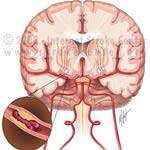Blood tests help predict stroke
The results of a blood test with two inflammatory proteins, Lp-PLA2 and high CRP, may help identify people at risk of stroke, a new study suggests.
 The identification of these proteins may help provide prevention or even guidelines for making new anti-stroke drugs, according to the researchers.
The identification of these proteins may help provide prevention or even guidelines for making new anti-stroke drugs, according to the researchers.
According to Dr. Christie M. Ballantyne of Baylor College of Medicine in Houston (USA), forecasters often pay less attention to stroke and often simply think what predictions for coronary heart disease are also predictive of stroke. However, this is not true in all cases. For example, cholesterol levels have also been linked to the risk of coronary heart disease, but do not show a risk of stroke.
Ballantyne believes that measuring Lp-PLA2 and CRP levels will provide information about stroke prediction sooner and more effectively than methods based on traditional risk factors such as high blood pressure.
The finding is based on a study of nearly 13,000 middle-aged people with healthy looks for about 6 years to assess stroke rates and other effects. The study focused on 194 people who had had a stroke and 766 who did not have it.
The researchers found that stroke patients had much higher levels of Lp-PLA2 and CRP than others. More detailed studies show that people with high levels of Lp-PLA2 or CRP have twice the risk of stroke than others. This risk increased by 11 times in those with high levels of Lp-PLA2 and CRP.
Ballantyne said his team is studying Lp-PLA2 and CRP-based therapies that may help reduce the risk of stroke.
T.VY
- What blood tests can you know about?
- Blood tests can predict pregnant women giving birth prematurely
- Things to know about general blood tests
- The new method provides a life opportunity for stroke patients
- Stroke warning stroke
- The fluctuation of blood pressure is easy to cause stroke
- Ultra-fast blood tests with new equipment
- Blood tests can detect Alzheimer's disease
- How to prevent stroke
- Anti-clotting socks for stroke patients
- What to do to avoid disability after stroke?
- Stroke: Recognize and prevent
 Green tea cleans teeth better than mouthwash?
Green tea cleans teeth better than mouthwash? Death kiss: This is why you should not let anyone kiss your baby's lips
Death kiss: This is why you should not let anyone kiss your baby's lips What is salmonellosis?
What is salmonellosis? Caution should be exercised when using aloe vera through eating and drinking
Caution should be exercised when using aloe vera through eating and drinking